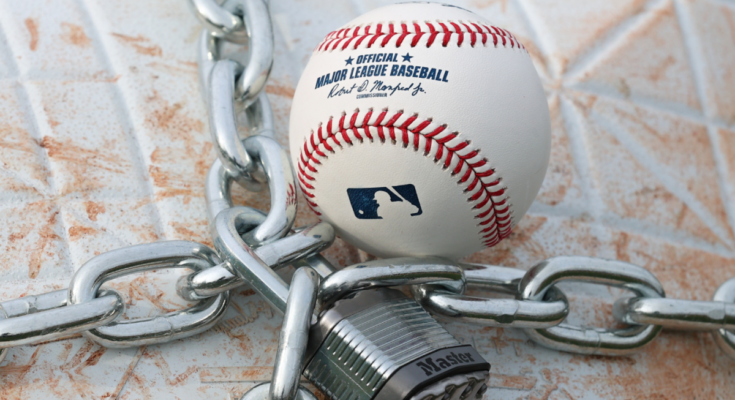Representatives from Major League Baseball and the MLB Players’ Association had another marathon day of bargaining sessions Tuesday in New York, trying to reach a deal for a new collective bargaining agreement to end baseball’s owner-imposed lockout. The two sides first met in the morning and multiple offers were exchanged through the course of the day, with negotiations stretching beyond midnight for the second time in eight days.
The latest reports, shortly after midnight, were that neither side is ready to stop for the night and both are discussing matters amongst themselves (via Chelsea Janes of Washington Post). Jon Morosi of MLB Network reports that a deal is possible “before daybreak.”
Commissioner Rob Manfred could announce more regular season games are being canceled if no deal is struck at some point Wednesday, though there is no firm “deadline” for an agreement. Manfred canceled the first two series of the regular season last week.
Please check the opt-in box to acknowledge that you would like to subscribe.
Thanks for signing up!
Keep an eye on your inbox.
Sorry!
There was an error processing your subscription.
Tuesday was MLB‘s third “deadline” for a 162-game season, so it appears we’re moving toward a fourth deadline. The league contends that if a deal is reached Wednesday, players could be in spring training by Friday, and a 162-game season could be played with players receiving full pay and service time. Games that have already been canceled would be made up through doubleheaders, off-days, etc.
MLB previously set a Feb. 28 deadline for an on-time Opening Day, then moved it to March 1 following a marathon bargaining session in which the two sides took baby steps toward a deal. Obviously these deadlines lack any real teeth seeing how 162 games is still on the table, now as of Wednesday.
The union has maintained it will seek full salary and service time no matter how many games are played in 2022, and they’ve threatened to withhold an expanded postseason without it. How many games are played, how much players are paid, and even the schedule itself are subject to bargaining. Manfred and MLB can not unilaterally dock pay for canceled games.
MLB and the MLBPA met quietly on Monday (the two sides have each expressed an interest in reducing the “media circus” that has followed negotiations) and gaps remain in the core economic proposals.
Through much of the day Tuesday, it appeared the ownership side was moving.
Here are the latest known proposals:
Minimum salary | $570,500 | $700,000 increasing to $770,000 in 2026 | $725,000 with $20,000 increase in 2023 and 2024, CPI increase in 2025 and 2026 |
Competitive balance tax threshold | $210 million | $230 million in 2022 rising to $242 million in 2026 | $238 million in 2022 rising to $263 million in 2026 |
Pre-arbitration bonus pool | N/A | $50 million with no increases | $80 million with $5 million increase per year |
The latest offer from the owners ranging from $230M-$242M over the next several years comes with “strings attached,” according to Drellich, on issues that concern the players. Drellich later reported those strings to be:
- MLB adding an extra level to penalize teams for going significantly over the CBT threshold. For example, using their proposed $230 million threshold. Teams would be penalized monetarily for going over that. Then penalized additionally for going over $250 million. Then again for $270M-plus. And then the fourth tier, an additional penalty for going over $290 million. Previously, there have been only three tiers of taxes for going over.
- MLB would give up the qualifying offer system, but only if it can institute an international draft. This would be a huge deal and players have previously been adamantly against it.
- MLB could make rule changes each offseason in expedited fashion without getting an agreement from the players.
MLB had previously not offered above $30 million for the pre-arbitration bonus pool, so the move to $50 million (reported by Russell Dorsey of Bally Sports) is notable.
Multiple reports indicate both the MLB and the players have agreed on 12 playoff teams.
Four owners — Bob Castellini (Reds), Chris Ilitch (Tigers), Ken Kendrick (Diamondbacks), and Arte Moreno (Angels) — voted against the $220 million competitive balance tax proposal last week. Twenty-three votes among the 30 owners are needed to ratify a deal, and SNY’s Andy Martino says there is confidence the league has those votes at the $228 million proposal.
The union’s primary objective is putting more money in the pockets of players early in their careers. Roughly two-thirds of the player pool had 0-3 years of service time last season, meaning they had not yet reached arbitration and make something close to the MLB minimum. The MLBPA dropped proposals for earlier arbitration and earlier free agency a few weeks ago.
Coincidentally enough, Apple announced a new streaming partnership with MLB on Tuesday. Two games as part of a “Friday Night Baseball” doubleheader will air exclusively (meaning fans will be unable to watch these games on cable or another streaming service) on Apple TV each week beginning this year. Surely the MLBPA took notice of the Apple deal and added revenue.
“There’s not endless money out there,” Yankees president Randy Levine said Monday. “Any perception that there’s endless money, especially after COVID, is just not true.”
Although a 162-game season is still on the table, the calendar is working against MLB and the MLBPA, and a shortened season will soon be unavoidable. Teams played 153-155 games following the 1972 strike, 103-111 games around the 1981 strike, and 144 games following the strike in 1995.
At 97 days and counting, the owners’ lockout is the second-longest work stoppage in baseball history, behind only the 1994-95 player’s strike (232 days). Here’s a timeline of the lockout.


